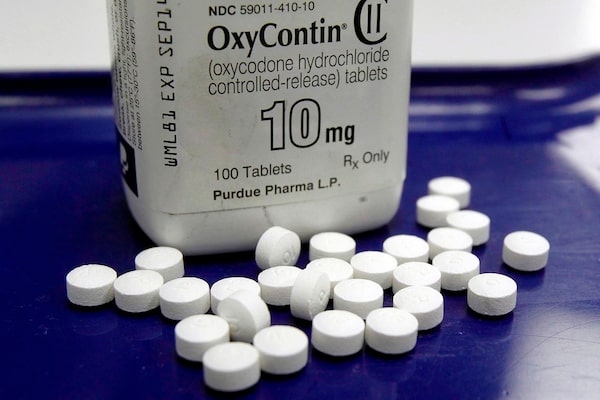
Purdue acknowledged that its marketing in the United States of its prescription painkiller OxyContin was misleading.The Associated Press
Purdue Pharma and its owners have reached a tentative, multibillion-dollar settlement with local and state governments in the United States that would resolve thousands of lawsuits against a company blamed for fuelling North America’s deadly opioid epidemic.
Under the proposed settlement, Purdue is expected to file for Chapter 11 bankruptcy and dissolve the company as it now exists, The New York Times reported on Wednesday. The Sackler family, which owns the company, would contribute US$3-billion in cash to the settlement over seven years.
It is not known how the parent company’s imminent bankruptcy filing will affect lawsuits launched against Purdue in Canada.
The proposed deal ends weeks of speculation swirling around the solvency of Purdue and comes as the first federal trial against opioid manufacturers and distributors is scheduled to get under way in Cleveland next month.
Purdue has acknowledged in the United States that its marketing of its prescription painkiller OxyContin was misleading, with the company and three of its top executives paying a total of US$634.5-million in 2007 to settle civil and criminal charges.
Purdue’s Canadian operation has not made a similar admission of wrongdoing.
On Wednesday, Purdue Pharma in Canada reiterated that it is a separate company from its American counterpart.
“Any decision by Purdue Pharma L.P. to negotiate a settlement in the U.S. would not directly affect our business,” read a statement provided by spokeswoman Lisa Joyce. “We have no knowledge respecting any such negotiation.”
The proposed settlement is the first global arrangement, negotiated by a team of lawyers representing nearly 2,300 lawsuits in federal court, as well as by lawyers for the states. The resolution would end almost all of the cases against Purdue.
In Canada, the British Columbia government launched a lawsuit in 2018 against dozens of players in the opioid industry for their role in an overdose crisis that has devastated communities across the country. B.C. Attorney-General David Eby announced last month that the lawsuit now has the backing of other provinces.
Asked about any impact of a bankruptcy filing by Purdue on the provinces’ legal action, a spokesman for Mr. Eby said: “We are unable to comment on this question.”
The provinces aim to recover public-health care costs from pharmaceutical players for their role in an overdose crisis that has killed thousands of Canadians. The lawsuit accuses brand-name and generic manufacturers of deceptively marketing opioids as both being less addictive than actually known and for conditions they were not effective in treating.
More than 11,500 Canadians died from an opioid-related overdose between January, 2016, and December, 2018.
Canada’s opioid epidemic traces its roots to the mid-1990s, with the introduction of OxyContin.
Health Canada in 1996 approved the drug to relieve moderate to severe pain; until then, opioids had been used primarily for the seriously and terminally ill. Canada is the world’s second-highest per capita consumer of prescription opioids after the United States.
OxyContin was the top-selling long-acting opioid for more than a decade, generating more than US$30-billion for Purdue. At the same time, however, reports of addiction and overdose mounted among those who were prescribed the drug and those who used diverted pills illicitly. Purdue promoted OxyContin in North America as safer and less addictive than other opioids, encouraging doctors to prescribe the drug more widely for everything from back pain to fibromyalgia.
Last year, Purdue stopped marketing its opioids in Canada, in response to the federal government calling on drug companies to suspend marketing activities associated with opioids.
A proposed national settlement in Canada capping a decade-long legal battle involving Purdue has been in limbo for more than a year after two judges rejected it.
A Saskatchewan court judge rejected the settlement, saying the C$18-million in compensation that Purdue agreed to pay is neither fair nor reasonable for the people who became addicted after their doctors prescribed it. A second judge in Saskatchewan said the process followed to award an additional $2-million to the provinces and territories, which were also part of the lawsuit, was “rife with problems.”
Last Thursday, Saskatchewan Chief Justice Martel Popescul reserved his decision on whether a new approval hearing should proceed and if so on what terms.
"We’re closely following the ever-evolving situation in the United States,” said Joel Rochon, a Toronto lawyer who represents the patients.
With a report from Andrea Woo in Vancouver
Our Morning Update and Evening Update newsletters are written by Globe editors, giving you a concise summary of the day’s most important headlines. Sign up today.
 Karen Howlett
Karen Howlett